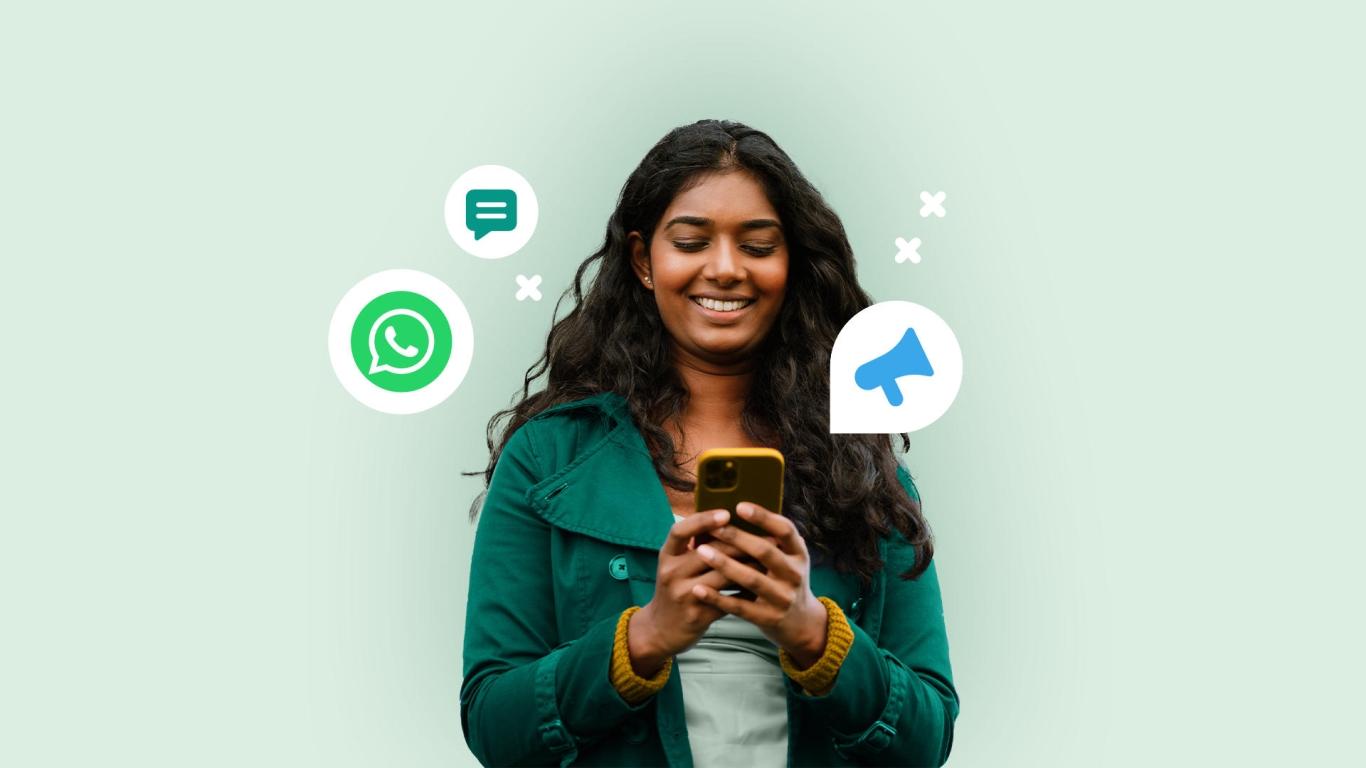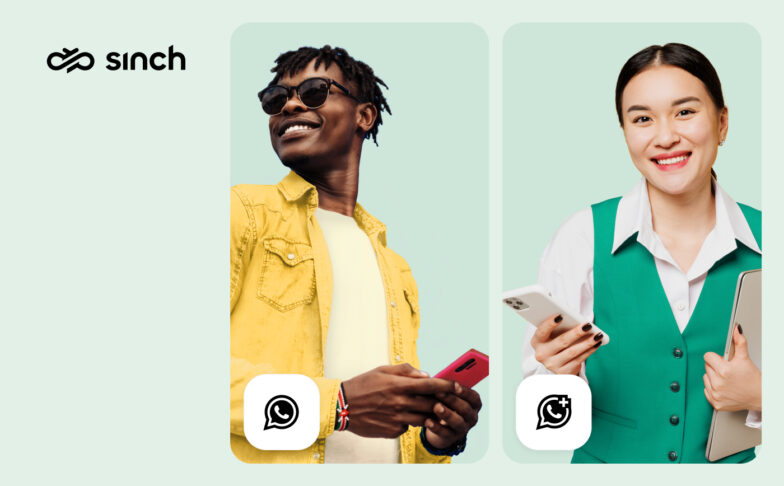Insights
Five easy ways to send WhatsApp promotional messages

Insights

If you’re wondering how to send marketing messages on WhatsApp, you’ve probably already realized that WhatsApp is one of the hottest marketing channels for businesses right now and that it should be part of your marketing efforts.
WhatsApp currently boasts over two billion monthly users worldwide, open rates around 98%, and click-through rates often well above 20%. Clearly, thinking about reaching consumers on WhatsApp is a no-brainer for marketers.
But here’s where it gets tricky: How do you actually send promotional messages on WhatsApp?
In this guide, we’ll explore five of the easiest ways to get started with WhatsApp marketing messages.
Before we dive in, a quick reminder that businesses can’t use the standard WhatsApp consumer application to interact with customers.
Whether you’re looking to do WhatsApp marketing, support customers on WhatsApp, or directly sell through the messaging app – the smartphone app that you use to chat with friends and family is off limits for any type of commercial use.

All the options we introduce here are official WhatsApp solutions for businesses.
Note that WhatsApp has currently blocked businesses from initiating WhatsApp marketing messages to users with a U.S. phone number to reduce spam. You can still send promotional WhatsApp messages to U.S. consumers, but only if they contact you first.
In 2018, WhatsApp launched a business version of its standard app: the WhatsApp Business app. It’s a free smartphone application specifically designed for small businesses and freelancers, and it comes with some basic business features like setting up a business account, uploading a product catalog, and adding information like business hours.
The WhatsApp Business app offers a messaging feature called WhatsApp broadcast. It allows businesses to send promotional messages for free through broadcast lists. To send a WhatsApp broadcast, you create a message and then put together a list of the contacts that you want to send the message to. Once you hit “send,” everybody on the list receives your broadcast message in their private WhatsApp chats.
Pros: WhatsApp broadcasts are easy to use and they’re free.
Cons: Your actual marketing possibilities are very limited since this app was never created for scalable WhatsApp marketing messages. Here’s where this option falls short:
Bottom line: Using WhatsApp broadcast lists to send WhatsApp marketing messages only works for very small businesses with extremely low message volumes that can handle everything manually, don’t require any integrations, and don’t need to worry about data compliance.
In September 2023, WhatsApp launched WhatsApp Channels. It’s an in-app feature available on the standard WhatsApp app for private users and on the WhatsApp Business app for businesses.
Once set up, businesses can send one-way messages on their channels to their followers. These messages can contain anything from product launches to company news.
Pros: Businesses can use WhatsApp Channels at no cost and if they manage to get a lot of followers, their content can reach thousands of people.
Cons: WhatsApp Channels only work for one-way messaging. While users can react with emojis, there are no other ways to interact with followers or even send messages to their private inboxes. Channels also lack chatbot and CRM integrations, analytics, and personalization features. They can work like a one-way newsletter tool but won’t offer much beyond that.
In addition, Channels updates aren’t displayed in the main chat. Users have to switch to the “Updates” tab to even see the new posts. And because posts are displayed chronologically, users might have to scroll far down in the feed to even see your update.
Bottom line: For most companies, Channels can be an interesting addition to their WhatsApp marketing strategy, but not a replacement for two-way messaging or scalable marketing campaigns on WhatsApp.
If you’re already using a marketing tool like HubSpot or Salesforce, you can add WhatsApp marketing messages to the mix. This is a great opportunity to get very granular about segmentation and meet customers on the channels where you see the highest engagement from them.
With certain integrations, it’s possible to connect your existing digital marketing platform and simply add WhatsApp as a marketing channel, including two-way (one-on-one) messaging – and in some cases even other mobile messaging channels like RCS and SMS.
Pros: Adding WhatsApp to an already existing marketing tool you’re using is a simple and elegant solution that requires no new technical infrastructure. As tools like HubSpot or Salesforce already come with many marketing features like automations and conversion metrics, you can simply use the same functionalities for your WhatsApp campaigns – and conveniently manage everything from the same platform.
Sinch, for example, offers seamless integrations with HubSpot, Salesforce, and many other external tools through our marketing messaging platform, Sinch Engage.
Bottom line: Adding WhatsApp to an existing marketing tool is best for businesses that already use a marketing platform and are looking to include WhatsApp in their channel mix with very little extra effort.
Aside from the free smartphone app, WhatsApp also offers another business tool, the WhatsApp Business API, also known as WhatsApp Business Platform.
Through WhatsApp partners like Sinch, this WhatsApp application programming interface (API) lets businesses connect to more advanced WhatsApp business features and enables several additional capabilities like CRM and ERP integrations, chatbots and other automations, personalized messages, analytics, and more. All of these can be custom-built.
Pros: The WhatsApp Business API gives you access tothe full suite of WhatsApp business features that you can customize for your own needs and use to fully scale your WhatsApp marketing.With the right setup, you can also stay compliant.
Cons: There’s a cost to sending WhatsApp (marketing) messages from the WhatsApp API, and it requires some in-house IT resources to set up and maintain the solution for your business.
Bottom line: The WhatsApp API is best for businesses or enterprises with in-house IT expertise, high-volume messaging needs, and very specific and complex WhatsApp marketing needs. If you’re interested in the WhatsApp Business API, get in touch with our team. Sinch offers a secure and verified API-based WhatsApp solution that also gives you access to other communication channels like RCS, SMS, Apple Messages for Business, Telegram, Viber, and more.
If you’re looking for a hassle-free way to send WhatsApp marketing messages, an out-of-the-box marketing platform might be the right fit for you.
Dedicated WhatsApp platforms offer marketers all the tools you’re looking for like a simple interface for creating and sending campaigns, a centralized inbox for two-way messaging, analytics, message templates, and easy integrations with your existing MarTech stack.
Typically, these platforms are plug-and-play, so it only takes minutes to get started.
Pros: With a WhatsApp marketing platform, you’re up and running in minutes and don’t need any special IT expertise.
Cons: There might be limitations to how much customization these tools allow.
Bottom line: These WhatsApp marketing platforms are best for businesses that want an easy solution to get started right away – while still having access to all the tools needed to scale their WhatsApp marketing.
WhatsApp is a rich mobile messaging channel that lets you include videos, images, carousels, product catalogs, GIFs, voice messages, share real-time live locations on a map, and in some regions even buy products and services directly on the app. So, your marketing opportunities are sheer endless and give you plenty of options to create interactive experiences and increase customer engagement.
Here are just a few types of promotional messages you can send on WhatsApp:
Remember that WhatsApp also supports voice and video calls, so your marketing doesn’t have to be strictly text- or image-based.
If you’re thinking of using WhatsApp beyond marketing, there are also plenty of opportunities to use the channel in customer support or to boost sales. For example, you can send customers transactional messages like relevant account notifications, service updates, shipment confirmations, and even one-time passwords for authentication purposes.
WhatsApp prohibits the use of their services for buying, selling, or promoting the exchange of some regulated or restricted goods and services, including:
There are some limited exceptions, for example around gambling and gaming in certain countries. You can find further details in WhatsApp’s Business Messaging Policy.
Pro tip: Always gather an opt-in from users before sending them marketing messages on WhatsApp to stay compliant and to ensure they really want to hear from you.
No matter which option you choose to send marketing messages on WhatsApp: Always make sure first that you work with a verified WhatsApp Business Solution Provider (BSP) like Sinch. BSPs are official WhatsApp partners that are authorized to offer WhatsApp solutions for businesses – including access to the WhatsApp Business API.
With a BSP, you don’t have to worry about security, safety, or compliance – and you get access to all the WhatsApp marketing tools that you need to run effective and scalable campaigns.
Sending your first WhatsApp marketing message through a Business Solution Provider is super simple. Sinch, for example, offers an out-of-the-box WhatsApp marketing platform – Sinch Engage – that’s specifically created to make it as easy as possible to send marketing messages to your audience.
With our out-of-the-box solution, it only takes minutes to set up an account and get started. And: You not only get access to WhatsApp marketing, because Sinch Engage also offers SMS and RCS marketing and more than 80 integrations with platforms like HubSpot, Zoho, NetSuite, Shopify, Salesforce, and more.